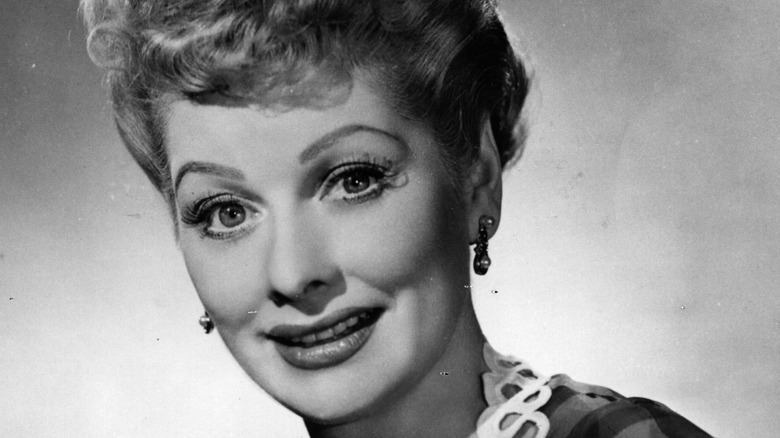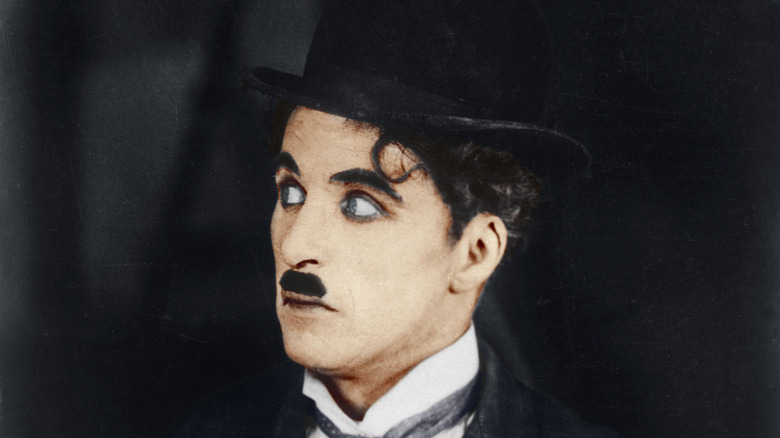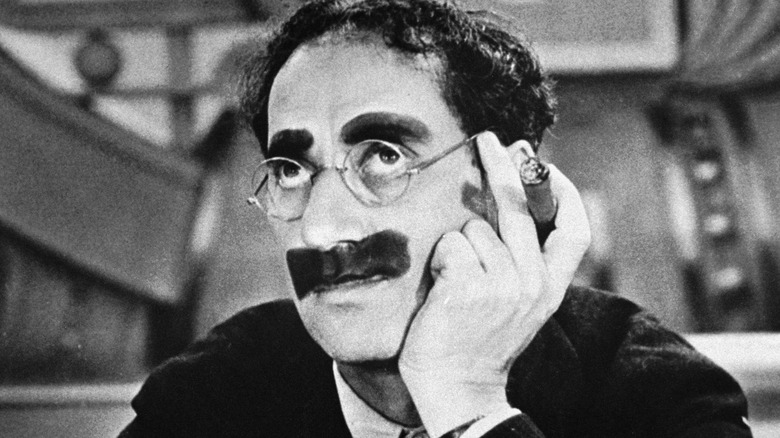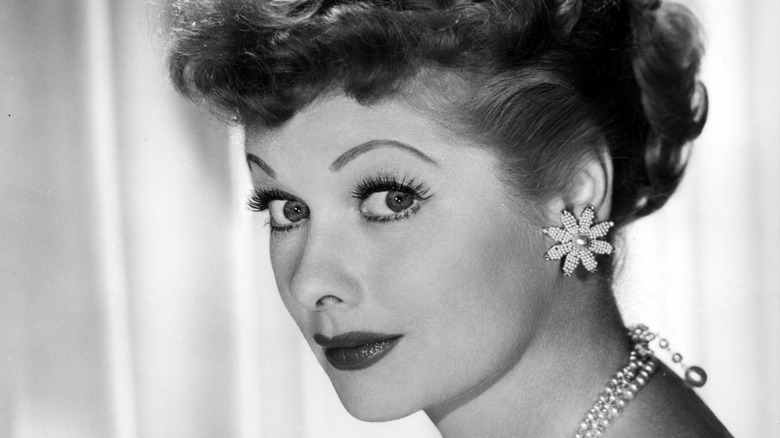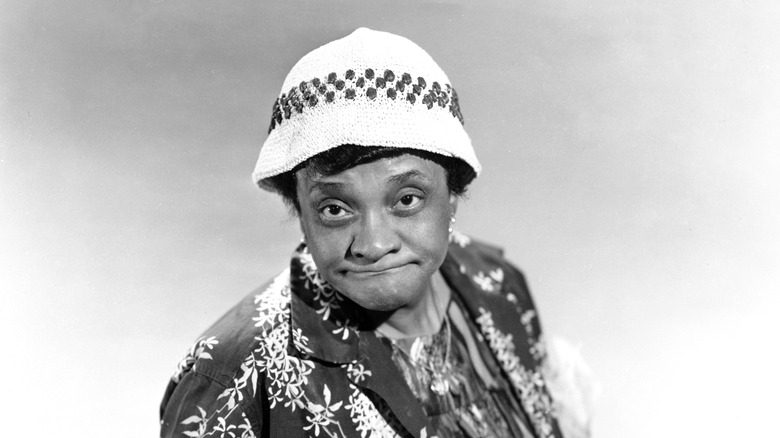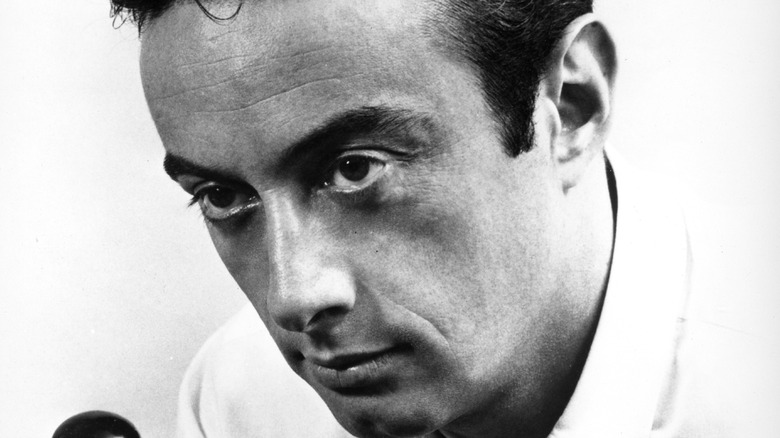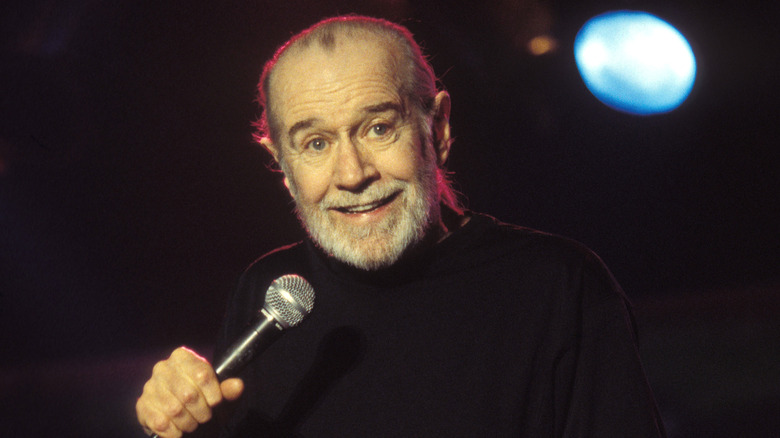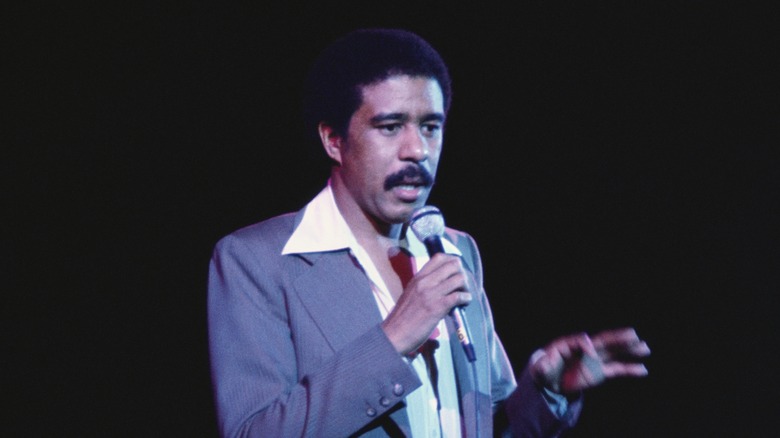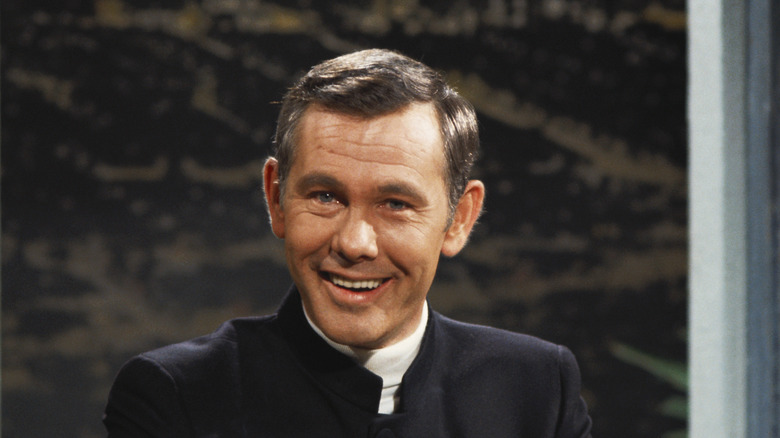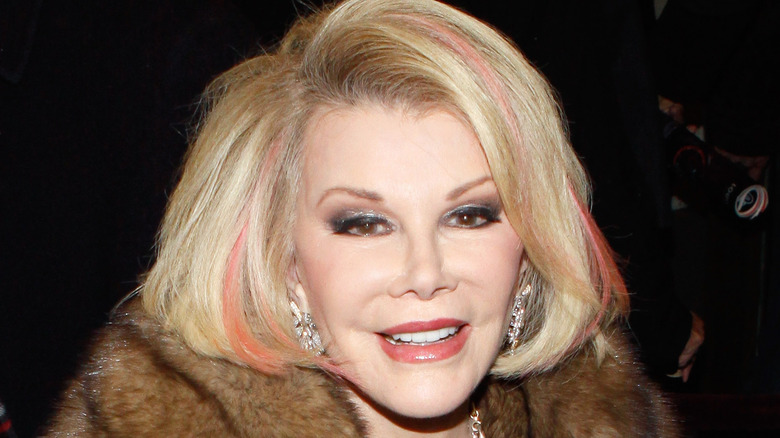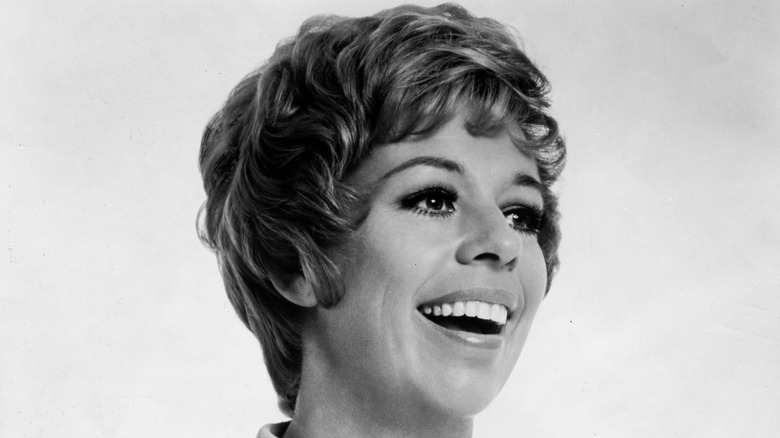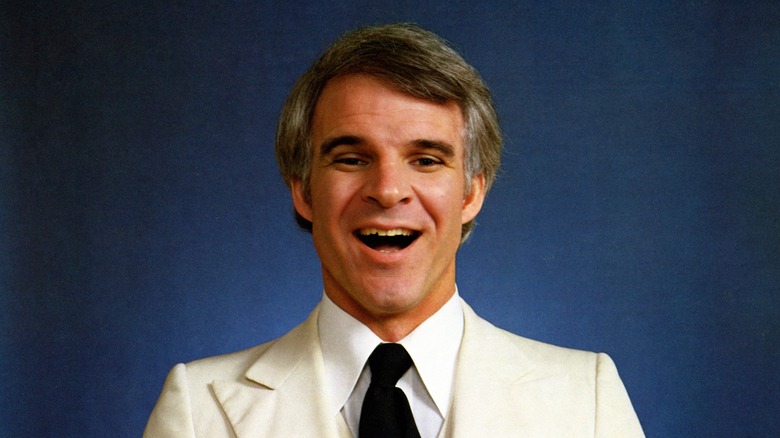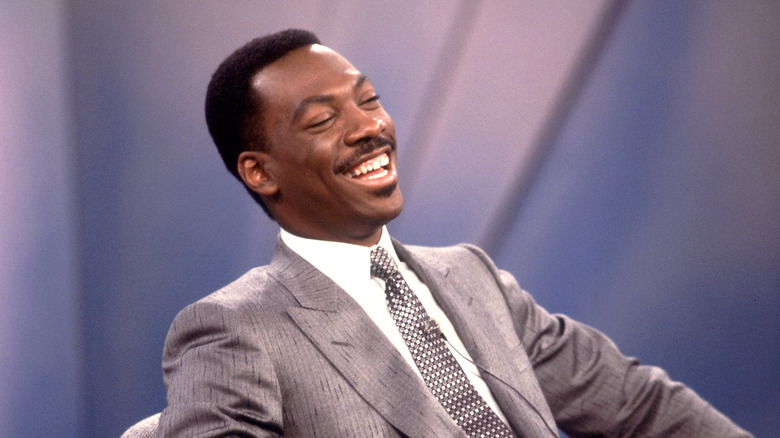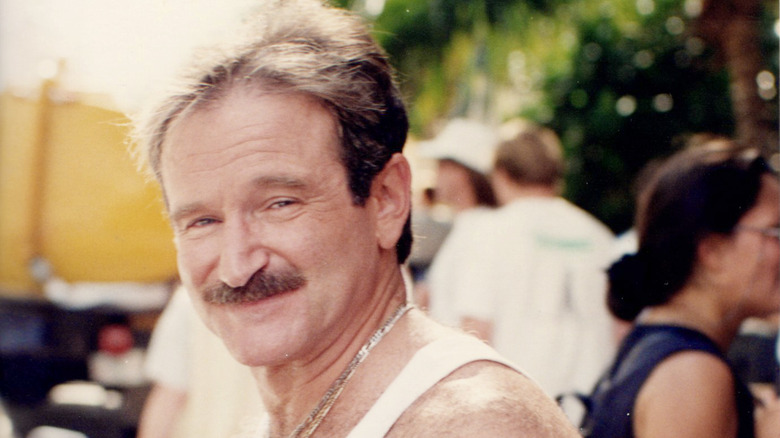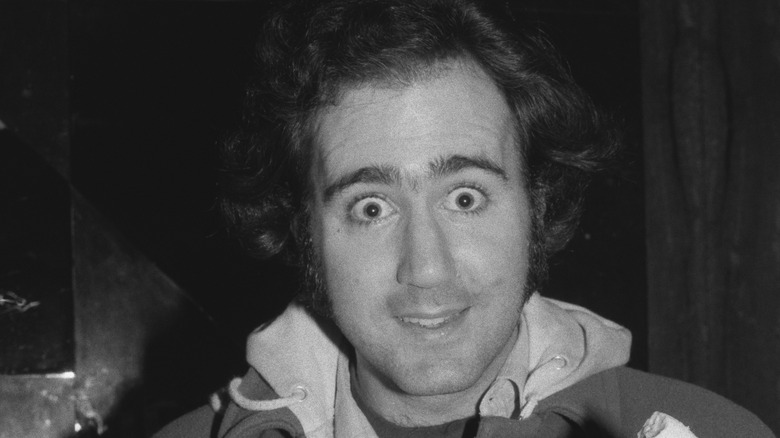The Most Legendary Comedians In History
A comedic performer of truly legendary stature has the ability to transcend their own time and speak to the whole of the human experience. Culture and technology may change and evolve, but the desire to explore the fundamental absurdity of existence through laughter remains a constant. These comedians created visual iconographies with their physical comedy, advocated for social justice by speaking truth to power, and acted as legitimate agents of cultural change.
Most importantly, however, the comedians listed here made us laugh. Gut-busting, roll-around laughter to serve as a balm for this often dark, painful, and tragic shared reality. Their methods vary, from clownishly absurd physical comedy to bitingly satirical and even raw sincerity, but their aim is the same: genuine catharsis and pushing the human conversation forward.
Charlie Chaplin
Hailed as a master comedian more than a century after his debut, Charlie Chaplin remains a singular icon of cinema. Chaplin, born into poverty in 19th century London, began his comedic career as a child performer in British music halls. After moving to Hollywood to work in films, Chaplin experienced a meteoric rise to fame as one of Hollywood's first movie stars in the 1910s. His character, The Tramp — with his oversized trousers, floppy shoes, and bristly mustache — first appeared on screen in 1914. He appeared in such celebrated screen classics as "City Lights," "The Kid," "The Gold Rush," and "Modern Times," all of which Chaplin starred in, wrote, produced, and directed. The Tramp was a cultural phenomenon and one of the most recognized figures in the world (via The Washington Post).
Chaplin's work is a critical link to early Hollywood history, with his films still being celebrated and re-released for contemporary audiences (via The Guardian). According to the Library of Congress, only 14% of movies released by major studios of the silent era have survived into the 21st century. Despite this dire statistic, many of Chaplin's films have survived, and they serve as important artifacts that provide insight into how we understand historical entertainment and culture.
Groucho Marx
Serving up sarcasm, wit, and irreverence, Groucho Marx was an original anti-establishment bad boy. As he sang in the movie "Horse Feathers," whatever it is, he's against it. Like Chaplin, Marx had an iconic look that distinguished his comedic persona from the rest of his contemporaries. His painted mustache, relentlessly bushy eyebrows, and round glasses are still sold as a novelty gift today. But his idiosyncratic look wasn't the only key to his success — Marx's zany wordplay and penchant for anarchy also became the stylistic foundation for subsequent generations of snarky and rebellious humorists.
Marx's act was cultivated on the vaudeville circuit stages with his brothers Chico, Harpo, Zeppo, and Gummo. With the invention of "talkies," the Marx Brothers (minus Gummo) brought their sensational stage act to Hollywood and became comedy stars. Movies like "Duck Soup” and "A Night At The Opera" served up irreverent humor and barbed political satire that was not universally beloved. In fact, fascist dictator Mussolini took the film as a personal insult and banned the former film in Italy. Marx's film stage and film work laid the foundation for future anarchic comedians, and his performances have garnered praise and tribute for generations (via BBC).
Lucille Ball
Lucille Ball was a true comedic legend. A glamorous redhead with a knack for pratfalls and twisted faces, Ball was a quintessential television star of the 1950s. She found middling success in the movies, but with her film career stalling, Ball made a fortuitous mid-career transition to the budding television industry. With her husband Desi Arnaz, Ball formed Desilu Productions in 1950 and launched the show "I Love Lucy" in 1951. It became an immediate smash, never dropping below third place in Nielsen ratings for its entire run (via New York Daily News).
In "I Love Lucy," Ball plays Lucy Ricardo, and her run as the character is filled with iconic comedy moments. Lucy's grape-vat fight ("Lucy's Italian Movie"), work on the chocolate candy assembly line ("Job Switching"), and stint as a Vitavitavegamin salesperson ("Lucy Does A TV Commercial") are all part of pop culture's comedic cannon. Not only did Ball bring the laughs, but she brought realness as well, pushing the limits of network censorship by being pregnant on TV. "I Love Lucy" and Ball's innovative performances continue to be an entertainment phenomenon, and with the show being dubbed into 22 languages and seen in 80 countries (via Library of Congress), it would be hard to find anyone who doesn't love Lucy.
Moms Mabley
Jackie "Moms" Mabley was the stage persona of Loretta Aiken, born in 1894 in North Carolina. An elderly woman serving up blunt sexual and raunchy comedic observations on life, Moms Mabley straddled the worlds of vaudeville and modern comedy. Getting her start on the T.O.B.A and "Chitlin' Circuit" — venues that catered to Black audiences — she steadily refined the character of "Moms." Her slouchy body language and frumpy housecoats gave her comedic license to say things that wouldn't play in the same way if not disguised under her trademark crochet hat. Mabley became very successful, even becoming the first female comic to play the legendary Apollo Theater in 1939 and the first Black woman to play Carnegie Hall in 1962.
Mabley was a popular performer with Black audiences from the '30s through the '50s, and it was in the 1960s that she made the leap to television and gained visibility with a national audience. With appearances on "The Ed Sullivan Show," "The Smother Brothers Comedy Hour," and "The Merv Griffin Show," Mabley made subtle political commentaries using the toothless, self-deprecating nature of "Moms" to give a biting voice to progressive social issues. Whoopi Goldberg said of Mabley, "Moms opened the door for women to stand up and be funny." (via Ms.)
Lenny Bruce
As much a social critic as a comedian, Lenny Bruce challenged the status quo with his provocative freestyle routines. Emerging on the comedy scene in post-war America, the iconoclastic Bruce and his "sick" routine upended conventional ideas of comedy at the time, and he was criticized for bringing politics and social critique into his act. When Bruce finally made his 1959 television debut on "The Steve Allen Show,” he was introduced as "the most shocking comedian of our time" (via The Paley Center for Media).
Bruce questioned contemporary social mores by examining language and exploring taboo topics. His open defiance of authority made his growing popularity a threat to established power structures, and he was arrested multiple times, including in Chicago in 1962, when he was convicted of violating a state obscenity law. The 1962 conviction was eventually overturned by the Illinois Supreme Court, which deemed Bruce's act "social commentary" and not obscenity — a landmark victory for First Amendment free speech rights. Bruce pushed the boundaries of thought-provoking comedy and showed how the power of language could be used as a force for social change.
George Carlin
To George Carlin, "By and large, language is a tool for concealing the truth" (via The New York Times), and his routine masterfully played with words to skewer establishment thought. A direct descendant of Lenny Bruce's confrontational comedic style, George Carlin wasn't always on the path to counter-culture comedic stardom. Indeed, Carlin's routine began as mostly clever wordplay with playful nods to contemporary attitudes. Then, in the 1970s, he threw out his stuffy suit and tie, put on some jeans, and grew out his hair. Carlin centered his authentic views in his comedy, poetically riffing on anything and everything, straddling a fine line between poking fun and bitter rants. Carlin's countercultural icon status even led him to be the guest host for the premiere broadcast of NBC's "Saturday Night Live" in 1975.
Like Bruce, Carlin's routine faced the scrutiny of the courts. When his "Seven Words You Can Never Say On Television" routine was broadcast on radio, it was ruled "indecent" by the Federal Communications Commission. Ultimately, the decision that was upheld by the Supreme Court in 1978, where they decided Carlin's bit was indecent, but not obscene — a ruling that still holds to this day.
Richard Pryor
There may be no comedian more influential and more celebrated than the legendary Richard Pryor. Whether it was stand-up, writing, or acting, Pryor was all about telling stories that spoke truth to power. Rising up the ranks of the comedy world with a more traditional routine, Pryor shifted gears in the late 1960s to embrace the counterculture and explicit language in his act. In the 1970s, Pryor applied his versatile talents in Hollywood by writing for such television shows as "Sanford and Son" and "The Lily Tomlin Show." Pryor also co-wrote the groundbreaking comedy "Blazing Saddles" and became a movie star in his own right, appearing in films like "Silver Streak," "Stir Crazy," and "Brewster's Millions."
While steadily building a successful Hollywood career, it was Pryor's comedy albums that launched him into superstardom, taking personal tragedies and weaving them into hilarious stories, all while pushing the boundaries of how these stories were told. Releasing 21 albums over 15 years, Pryor's provocative comedy records became the touchstone for future generations of comedians, and his influence on the art of comedy remains unmatched.
Johnny Carson
Johnny Carson, "The King of Late Night," was one of the biggest and most popular stars in TV history. During his tenure as the host of "The Tonight Show Starring Johnny Carson," he wielded unprecedented influence in pop culture and in the television industry. For three decades starting in 1962, Carson hosted "The Tonight Show," a program that served as an entertainment nightcap for the nation. At the height of its success, "The Tonight Show" alone brought in 17% of NBC's profits (via The Washington Post). The show's structure of host monologue, skits, and celebrity guests is still used today by network late-night programming.
Carson's star-making ability in the world of comedy is legendary. Getting booked to perform a set on "The Tonight Show" was a possible ticket to fame and fortune for an aspiring stand-up. Comedians would even study the nuances of Carson's body language to better their chances at getting the ultimate seal of approval from Carson — an invitation to sit on the couch. Future titans of television comedy like Jerry Seinfeld, Ellen DeGeneres, Drew Carey, and Roseanne Barr all got the nod from Carson to take a coveted post-set plop on the sofa.
Joan Rivers
Can we talk about Joan Rivers? Following in the footsteps of stand-up comedy pioneer Phyllis Diller, Rivers pushed the boundaries of comedy for five decades by talking honestly about her life and dishing out crass observations on pop culture. If someone was shocked or offended by her jokes, her typical response was, "Oh, grow up!" (via The New York Times).
A frustrated actress looking for ways to free up her days to audition, Rivers found the perfect solution by taking stand-up comedy jobs in New York in the late 1950s. She had her breakthrough as a guest on "The Tonight Show with Johnny Carson" in 1965, starting a years-long string of appearances and guest-hosting stints on the show. After Rivers took her own late-night hosting gig at Fox Network, she and Carson had an infamous falling out. Personal and financial struggles followed, but the ever-resilient Rivers pivoted with the times and persevered. She revolutionized red carpet coverage of Hollywood awards shows, creating a new genre of entertainment and forever changed the meaning of the question, "Who are you wearing?" Whether it was plastic surgery or diversifying her career (she was also an actress, author, and QVC salesperson), Rivers always had the last laugh.
Carol Burnett
A trailblazer in the world of television comedy, Carol Burnett was the first woman to host her own variety sketch series. "The Carol Burnett Show" debuted in 1967 and was a sensation, earning 70 Emmy nominations and 25 Emmy awards during its 11-season run on CBS. Along with co-stars Vicki Lawrence, Tim Conway, Harvey Korman, and Lyle Waggoner, "The Carol Burnett Show" delivered classic comedy every Saturday night. Skits like "The Family," "The Dentist," and "Went With the Wind!" have become comedy standards. In fact, the curtain costume from "Went with the Wind!" is so culturally significant it's now part of the Smithsonian collection.
In addition to her pioneering TV work, Burnett is an accomplished stage and film performer. She got her start on Broadway, where she earned a Tony nomination for her role in the musical "Once Upon A Mattress," and she took on the scene-stealing role of Miss Hannigan in the 1982 film adaptation of the musical "Annie."
Steve Martin
"Wild and crazy guy" Steve Martin has been entertaining audiences for decades with his witty and irreverent brand of comedy. Starting his career in a Disneyland magic shop, Martin transitioned to the writers' room of variety shows like "The Smothers Brothers Comedy Hour" and "The Sonny and Cher Show." But as groovy as these writing gigs were, Martin was destined to be in front of an audience. His comedy albums launched him into legitimate rock-star status, and he performed his routines to stadiums of cheering fans, selling millions of copies in the process. After ascending to the top of the comedy world, Martin retired his stand-up routine in 1981 and wouldn't return to the stage for over 30 years.
Martin's stand-up career success ran parallel to his legendary guest-host turns on "Saturday Night Live," where he's made 15 appearances (via People). Martin's classic song, "King Tut," and characters like The Festrunk Brothers (with Dan Aykroyd) originated on the late-night sketch series. When Martin stepped away from the comedy stage, he walked onto the film set, launching a decades-long iconic film career.
Eddie Murphy
Eddie Murphy was a pop culture phenomenon in the 1980s. By the time he was 23 years old, Murphy was being paid $1 million per live show, saved a moribund "Saturday Night Live," and was on his way to becoming one of the most successful Black actors in Hollywood history (via The Washington Post). His profanity-laced stand-up special "Eddie Murphy: Delirious" and the theatrical release "Eddie Murphy: Raw" promised uncut and uncensored laughs, and the latter remains the highest-grossing stand-up comedy movie of all time (via Box Office Mojo).
Murphy joined the cast of "Saturday Night Live" in 1980, a critical point in the show's history. Original executive producer Lorne Michaels had left the series, and the new regime was tasked with saving the show from cancellation. The decision to focus on Murphy's talents revived the struggling show, with Murphy's characters like Mr. Robinson, Gumby, and Velvet Jones delivering big laughs on Saturday nights. While Murphy spent his Saturday nights at Rockefeller Center, he was also a mega movie star — "48 Hours," "Beverly Hills Cop," and "Coming To America" were all '80s comedy blockbusters. Murphy's cinematic superstardom continued into the '90s and '00s with more family-friendly fare like the "The Nutty Professor," "Doctor Dolittle," and "Shrek" franchises.
Robin Williams
Robin Williams' unmatched energy, both on-stage and off, propelled his career for decades. Williams was a classically trained actor, having attended the prestigious Juilliard School, and channeled his frenetic performance style into stand-up comedy. He got his big television break on the "Happy Days" spinoff "Mork & Mindy," playing the title role of Mork, an alien sent to Earth to observe humans in Boulder, Colorado.
As with other performers on the list, TV exposure led to movie roles, and Williams' early film credits include "Popeye" and "The World According to Garp." While his stand-up persona fed on chaotic energies, Williams also excelled at dramatic film roles like "Dead Poets Society," "The Fisher King," and his Academy Award-winning role in 1997's "Good Will Hunting." Williams's ability to tap into his emotional vulnerability endeared him to audiences. Regarding his talent, fellow comedian Margaret Cho told The Guardian, "As an artist, Robin Williams represented the dizzy heights of brilliance we could aspire to. He was absolutely free and absolutely stunning — he could do anything and often did."
Andy Kaufman
Andy Kaufman remains an enigmatic figure in the world of comedy. Decades after his death, Kaufman's comedic style — filled with elaborate pranks, obfuscations of truth, and disguises — still mystifies audiences. Kaufman's early career in stand-up was in character, perfecting his Foreign Man routine that evolved into the character Latka Gravas on the 1970s sitcom "Taxi." Another of Kaufman's notable stage personas was Tony Clifton, a boorish and antagonistic lounge singer who hurled insults at the audience. Through Clifton, Kaufman was able to blur the lines of reality, with people actually believing that Clifton was a real person. To further befuddle audiences, Kaufman slyly passed off the Clifton persona to another comedian, Bob Zmuda.
Kaufman was a pioneer of anti-humor and cringe comedy, subverting ideas of what constituted humor. For his performance at Carnegie Hall, Kaufman offered to take the audience out for milk and cookies and proceeded to do exactly that. He threw himself into the world of women's professional wrestling and staged beefs between himself and wrestler Jerry "The King" Lawler on one of his many appearances on "Late Night with David Letterman." Kaufman played these routines as a straight man, and his complete dedication to the bit took comedy to new levels of absurdity.
